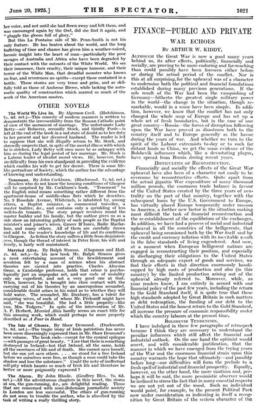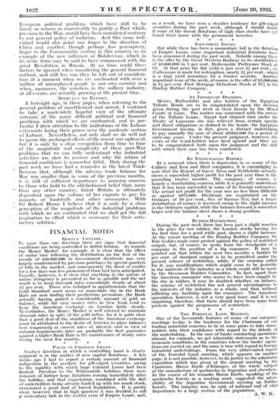FINANCE-PUBLIC AND PRIVATE
ALTHOUGH the Great War is now a good many years behind us, its after effects, politically, financially and socially, are proving to be more enduring and far-reaching than could possibly have been foreseen either before or during the actual period of the conflict. Nor is this at all surprising, for the upheaval was of a character to undermine both the political and financial foundations established during many previous generations. If the sole result of the War had been the vanquishing of Germany—hitherto the greatest single military power in the world—the change in the situation, though re- markable, would in a sense have been simple. In addi- tion, however, we know that the conflict has not only changed the whole map of Europe and has set up a whole set of fresh boundaries, but in the case of one great country—Russia—the forces of disruption following upon the War have proved as disastrous both to the country itself and to Europe generally as the havoc during the years of war. And whether we turn to the spirit of the Labour extremists to-day or to such far distant lands as China, we get the same evidence of the Bolshevik influences which, like a devastating plague, have spread from Russia during recent years.
DIFFICULTIES OF RECONSTRUCTION.
Financially and socially the effects of the Great War upheaval have also been of a character not easily to be overcome by reconstructive efforts. Quite apart from the actual gigantic War expenditure of many thousand million pounds, the enormous trade balance in favour of the United States created by the three years of neu- trality on the part of that country, together with the subsequent loans by the U.S. Government to Europe, has virtually placed Europe temporarily under ransom to America, a further new factor in the situation making most difficult the task of financial reconstruction and the re-establishment of the equilibrium of the exchanges. In addition, we have had a process of social and industrial upheaval in all the countries of the belligerents, that upheaval being occasioned both by the War itself and by the credit and currency inflation with its inevitable result in the false standards of living engendered. And now, at a moment when European belligerent nations are engaged in reconstructing their position, and especially in discharging their obligations to the United States through an adequate export of goods and services, we find their efforts in that direction enormously handi- capped by high costs of production and also (in this country) by the limited production arising out of the upheaval already referred to. Moreover, while, as your readers know, I am entirely in accord with our financial policy of the past few years, including the return to the Gold Standard itself, it is quite true that these high standards adopted by Great Britain in such matters as debt redemption, the funding of our debt to the United States and the honest return to the Gold Standard, all increase the pressure of economic responsibility under which the country labours at the present time.
BOLSHEVIK TENDENCIES.
I have indulged in these few paragraphs of retrospect because I think they are necessary to understand the peculiar influences which still affect the financial and industrial outlook. On the one hand the optimist would assert, and with considerable justification, that the manner in which we have emerged from the trying years of the War and the enormous financial strain upon this country warrants the hope that ultimately—and possibly before long—our difficulties will form the prelude to a fresh spell of industrial and financial prosperity. Equally, however, on the other hand, the more cautious and, per- haps it will be said, the more pessimistic observer would be inclined to stress the fact that in many essential respects we are not yet out of the wood. Such an individual would point, for example, to the present Political Pact now under consideration as indicating in itself a recog- nition by Great Britain of the serious character of the European political problems which have still to be faced, so serious as conceivably to justify a Pact which, previous to the War, mould have been considered contrary to our general policy of isolation. And this same indi- vidual would also point one finger in the direction of China and another, though perhaps .less peremptory, finger to the Communistic section in this country as an example of the new influence of ailsheVism, which in its acute form may be said to have -commenced with the great Revolution in Russia.. At no time could these factors be- ignored when considerino'b the general financial outlook, and still less can they be left out of considera- tion at a -iminient'Uthen we:arc confronted with over a million Of- uneMployed people in our own country and when, moreover, -the numbers in the colliery industry, at all events, are actually growing at the present time.
• STIMULUS TO EFFORT.
A fortnight ago, in these pages, when referring to the general-problein of unsettlement and unrest, I ventured to take- a • moderately hopeful view of the ultimate outconi. Of -'the many difficult political and financial probleMs -viith which we are confronted, and in par- ticular 'I- dieiV attentiOnto the' itidi6ations- of the Labour extremists losing their power over the moderate section of Labour. Nevertheless, not only shall we do well not to ignore the prolonged effects of the recent war upheaval, but it is only by a clear recognitiOn from time to time of the magnitude and complexity of these post-War problems that we can fully understand why industrial activities are slow to recover and why the return of financial confidence is somewhat _fitful. Only during the is past week we have had a reminder in the latest 'Trade Returns that, although the adverse` trade balance for May was smaller than in some of the previous months, it is still of sufficient importance to occasion .Concern to those who hold to the old-fashioned belief that; more than any other country, Great - Britain is ultimately dependent upon the volume of her exports to ,pay for imports of foodstuffs and other necessaries: With Sir Robert -Horne I believe that it is only by' a clear perception of the magnitude of the industrial problems with which we are confronted that we shall get the full . inspiration to effort which -is necessary for their satis- factory solution.











































 Previous page
Previous page